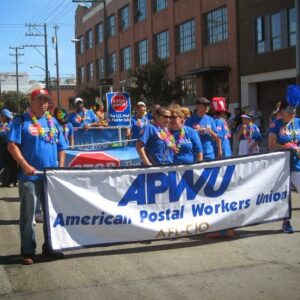November 1, 2015
Fighting On for A Good Contract
(This article first appeared in the November/December 2015 issue of The American Postal Worker magazine.)
This year, we have dedicated ourselves to negotiating a successor to the 2010 Collective Bargaining Agreement, which expired in May.
The Feb. 19 opening session demonstrated our approach to this round of negotiations: We focused on the long-term future of the USPS and brought the interests of the public to the bargaining table.
In opening statements, actor-activist Danny Glover spoke on behalf of A Grand Alliance to Save Our Public Postal Service about the urgency of expanding – not cutting – postal services. Richard Trumka, president of the AFL-CIO, spoke about the importance of the contract not only to USPS employees, but to the future of good jobs throughout the country.
Our overarching goal is to negotiate a Collective Bargaining Agreement our members can live with for years, providing them confidence in their workplace and a safe and secure future. There is no reason for the Postal Service to “race to the bottom” – to test how low it can push wages and benefits and still get people to work. The success of the Postal Service lies in a loyal, skilled, well-paid workforce.
Long Road
Preparation for negotiations started long before bargaining. Early in 2014, union members, local and state leaders, and National Business Agents were asked to identify issues of concern, and much of our 2014 National Convention was devoted to discussing contract issues.
In accordance with our union constitution, we appointed a Rank and File Bargaining Advisory Committee, which critiqued proposals before negotiations began and as they progressed.
We reviewed our grievance-arbitration records to gauge problems and determine whether a change to contract language might help alleviate them. We also researched various wage and benefit trends.
Once negotiations got underway, little progress was made until May. In the week before May 20, when the contract was set to expire, there was considerable movement on work rules, resulting in a number of tentative agreements. The agreements were tentative because they were conditioned on reaching a complete contract.
We also had considerable discussion of wages and benefits.
APWU negotiators believed the progress was significant and decided to extend bargaining one week, through May 27.
Unfortunately, no additional progress was made. Although a number of unsettled matters remain, the Postal Service’s demand for a lower pay scale and reduced benefits for new employees is the major sticking point and precludes a voluntary agreement.
Mediation, Arbitration
The law requires that when a contract expires and the parties have not agreed to an alternative process, the parties must enter mediation. The Federal Mediation and Conciliation Service appointed a mediator, and the Postal Service and the APWU met with him on several occasions.
The mediator’s role is to help the parties find a path to voluntarily agreement. He has some authority to compel the parties to cooperate with him, but has no authority to compel agreement on a contract. That process has now come to a close.
When mediation fails to result in an agreement, the next step is “interest arbitration,” where an arbitrator weighs the interests of each party and determines the provisions of the successor contract. The arbitrator will only decide the issues put before him or her by the union or management.
It is possible that the tentative agreements reached during negotiations will become part of the next contract; however, either side is free to abandon the tentative agreements and argue in interest arbitration for something else.
Extensive Hearings
Interest arbitration involves a panel of arbitrators. If our contract goes to arbitration, the Postal Service will appoint an arbitrator, as will the APWU. The party-appointed arbitrators act as advocates; there is no pretense that they are neutral. The two party-appointed arbitrators will select a neutral chair.
From that point forward, the process will focus on persuading the neutral chair, which will be done through extensive hearings. In the past, hearings have often lasted 20 days – scheduled intermittently to accommodate the arbitrator’s calendar. The hearings involve testimony from dozens of witnesses – many of them experts in economics and other fields. There also will be hundreds of exhibits and thousands of pages of transcripts.
Both the APWU and the USPS have been busy for some time preparing for the possibility of arbitration.
In mid-contract “rights” arbitration, once the union and management have finished presenting their cases and written briefs, the arbitrator goes home and writes a decision, which he or she mails to them. Interest arbitration is quite different. At the end of the hearing, the panel of arbitrators goes into “executive session” to write the award.
The neutral chair is in the driver’s seat. If there are 20 issues to be decided, he or she only needs one party to agree on any particular issue. However, the neutral typically attempts to get agreement from both sides to avoid the filing of a dissenting opinion by one or both of the party-appointed arbitrators. This process allows the party-appointed arbitrators to continue to argue the case and attempt to shape the final award as the neutral arbitrator decides issues.
Given the need for a respected arbitrator in whom both sides have confidence, selecting the neutral arbitrator and establishing the ground rules for the hearing can take some time. Since such a neutral arbitrator is likely to be a busy professional, it may take months to complete the hearings.
While the law provides a rather stringent timeline, the parties have always found it necessary to agree to alternate schedules to allow for a fair and thorough hearing. If we find that we have to engage in interest arbitration, hearings probably will begin in 2016.
However, throughout the mediation and arbitration process, the APWU and USPS can – and likely will – continue to negotiate informally. Entering the interest arbitration process does not prevent us from reaching a voluntary agreement at any time before the decision is published.


